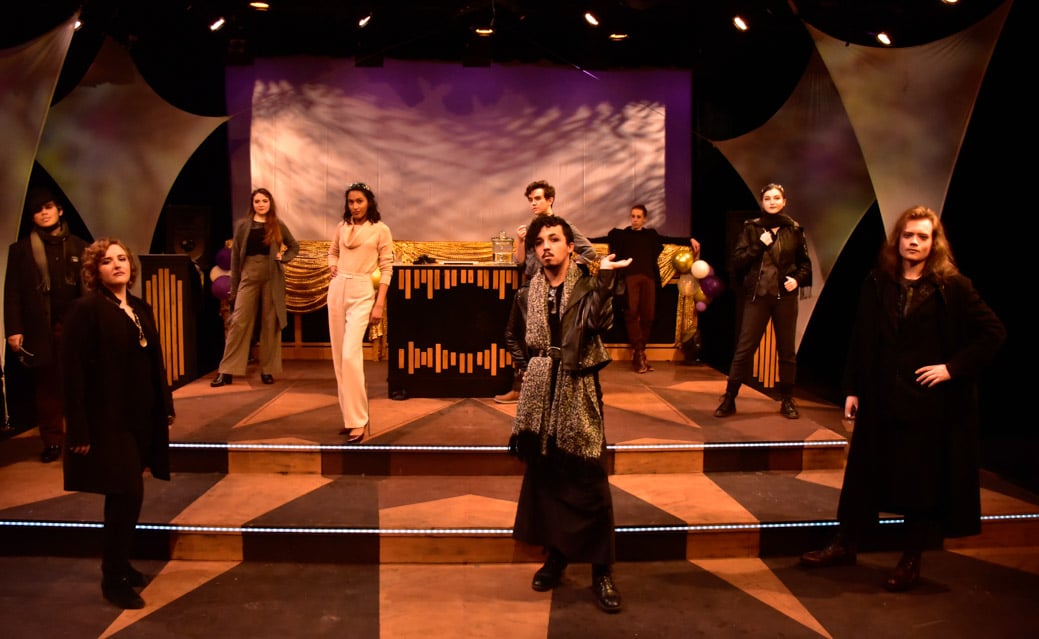The world as we know it in An Enemy of the People
Theatre Erindale’s latest production immerses audiences in a political setting that is all too familiar.
What does it mean to advocate for equality? How does political activism abet and hinder societal judgment? Do family quarrels always have to resolve themselves? In its thought-provoking, emotional, and educational staging, Theatre Erindale’s production of An Enemy of the People sought to answer these complex questions. Originally written by Henrik Ibsen in 1882, the play was directed by Ray Hogg and adapted by Maria Milisavljevic with Richard Rose to fit a modern Canadian context. Set during a pandemic, the show captivated audiences through a realist and critical approach to family drama, political scandals, and media biases.
Set in the small town of Miramichi, New Brunswick, the story depicted small-town life, where news is misinterpreted as quickly as it travels. Dr. Tom Stockmann (Oliver Parkins), the medical chief of the town’s water systems, discovered that the water pumped through the local spa was contaminated with chemicals like arsenic. Tom’s sister and town mayor Peter Stockmann (Reese Cowley) refused to act on the water issue, threatening to fire him. The situation worsened as Morton Keele (Aaron Clarke), the father of Tom’s supportive partner Kirk (Austin Chaisson), refused to acknowledge the water issue as well. However, with limited resources, Tom and Kirk found support within the community. The town teacher Anna—also known as “The Captain”—(Bronwyn Keough), a local YouTube news team run by political activist Michael Campbell (Nicholas Buchanan), journalist Emma Chaisson (Amelia Woolfrey), and a film crew comprised of Drea Hasser (Nicholas Simao) and Sandy (Angel Haines), all did their part to document and fight the town’s water crisis. In the end, audiences were left to determine if “the truth” played a role in equality.
This adaptation paid tribute to the very real issues that present themselves in Canadian politics. Although “the truth must always come first,” a line used in the show, the biases that exist within our society restrain the rights of minority groups and taint honesty. Each voice on stage, whether they were an enemy or an ally, portrayed the damages that lie within the system.
“The line ‘there is no equality’ is one of the [The] Captain’s first lines spoken in the show while on a rant about her job as a teacher,” says Keough. “She talks about the curriculum and about having to lie to her young students about their country, when in reality, ‘there is no equality.’ There is something about her bitterness toward life’s circumstances, her acceptance of the lack of equality, and her simultaneous longing to be a saviour that makes Captain an extremely guarded character.”
Regardless of each character’s personal views on individualism, politics, and the media, the sense of community in the play was indestructible. In ways, “the adaptation allowed audiences into the performance,” said Clarke, who played Morton. Through the reshaping of a nineteenth-century Ibsen classic, audiences were brought into the action and forced to choose a “side” they identified with.
The show itself was a call to action. Amid its conflicts, the production used popular music to keep the plot in today’s age and to create moments of laughter and dancing. Almost every scene in the show was accompanied by familiar Spotify hits. From ABBA’s “Dancing Queen” to Soft Cell’s “Tainted Love,” every character in the show had a particular connection to each song.
“We were all instructed to make Spotify playlists for our characters close to the beginning of the rehearsal process,” said Parkins, who played Tom. “Often, if a character had an entrance to a song or a dance, the song playing in that moment [was] picked by that actor. Tom’s song is “Kiss” by Prince, a song that informs [audiences] a lot about his identity as a queer transgender man, something that isn’t explored much in the text.”
While connections to the LGBTQ2S+ community are not explicitly explored throughout the play, the music was tactfully crafted to showcase each character’s identity. However, identity was not only a byproduct of the music. Alongside these fun tunes, the dialogue in the show was captivating, powerful, and had me screaming behind my computer screen in both agreement and disapproval.
There is a lot to learn from Theatre Erindale’s An Enemy of the People, and these lessons can be put into action. Through this story, the cast encourages audiences to donate to Water First, an organization that supports and addresses the water challenges among Indigenous communities across Canada. Dozens of First Nations continue to live without access to safe drinking water, and despite our federal government’s resources, the Indigenous water supply issue continues to lack priority. If you are interested in finding out more and donating, please check out https://waterfirst.ngo/.
Arts & Entertainment Editor (Volume 49) | arts@themedium.ca — Julia graduated in 2022 with a major in English, and a Professional Writing and Communications and Drama double minor. She previously worked with The Medium as Theatre Erindale Correspondent for Volume 48. As the A&E Editor this year, Julia cannot wait to explore the wondrous world of arts and spark creative conversations amongst student writers. If she’s not writing, working, or spending too much money on overpriced iced coffees, you can find Julia singing tunes with her guitar, bingeing Netflix shows, or going on nature walks with her doggo Benji. You can connect with Julia on LinkedIn or Instagram.


